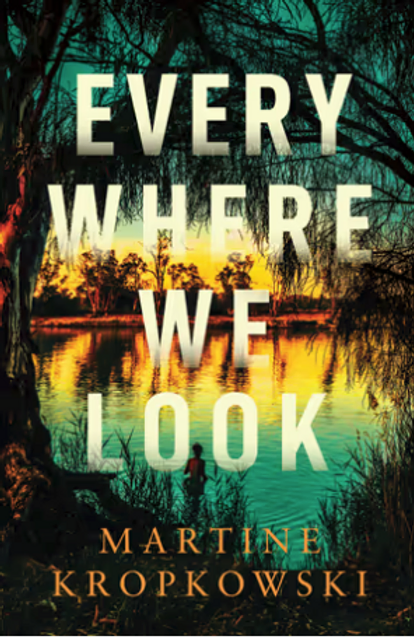Martine Kropkowski’s debut psychological thriller Everywhere We Look (Ultimo 2024) is a triumph of canvassing female relationships, domestic violence and coercive control almost without a single violent act on the page – the entire story is hint and subjective; sinister and menacing while just out of reach; anticipatory fear all the more traumatic because we are always guessing at what has happened in the past or what might occur in the future. Kropkowski has written a skilful and clever narrative that never states the obvious and yet fills us with terror.
Three women sit at the centre of the story, previously very close friends but whose friendship has fractured over the last year due to an incident or events that are in the beginning unclear. They come together in the regional town of Marcoy to spend time with each other and hopefully reset the dynamics of their relationships. Cassandra has no wish to go over or remember the past, and simply wants a weekend of wine and relaxation. Melissa has lived in a deep depression for the past year and wonders whether this weekend might help or only make things worse. And Bridie is leaving behind her toddler, fearing she is not a good mother or even a good person, but trying to pretend that she is coping fine.
While the weekend is meant to recement their bonds, none of the women want to revisit the reasons their friendship has fallen apart. That is all too painful.
But almost as soon as they arrive, they witness a young girl being coerced into a car seemingly against her will, an incident which brings up painful memories for each of them. This girl becomes a talisman who focuses their grief and their trauma, as they struggle with what they did or did not do a year earlier, and whether they can make amends by taking action this time.
The wonderful aspect of this novel is the restraint and reserve with which the author has written about difficult subjects. The pain, rage, anger, distress and frustration of #metoo is suffused through every page, but it is rarely voiced or explained or enacted. The author trusts the reader to instinctively read between the lines and piece together what has happened, and what is happening. Yes, this is a novel about the safety (or otherwise) of women but it approaches this from a number of different angles, and explores the power of an individual – or a community – to respond.
Great description scaffolds the story, especially the nuances of a small town, and the characters are uniquely depicted, their thoughts and interiority generously open for the reader to interpret. Kropkowski has included a slight magical realism element … witchcraft? Or instead the workings of minds that are guilty or resentful or depressed or damaged? Again, it is up to the reader to judge.
A haunting, atmospheric, tense story full of secrets, Everywhere We Look also examines themes of grief, loss, friendship, violence, vengeance and redemption, with a shocking but deliciously satisfying conclusion. This is a book for mothers and friends, partners and allies, male mates and husbands. It will mean something different for everyone but will always be thought-provoking, with the questions: What would I have done? and What would I do now, knowing what happened then?

